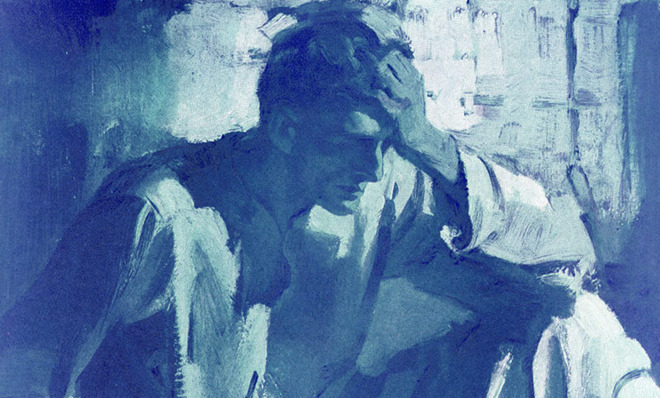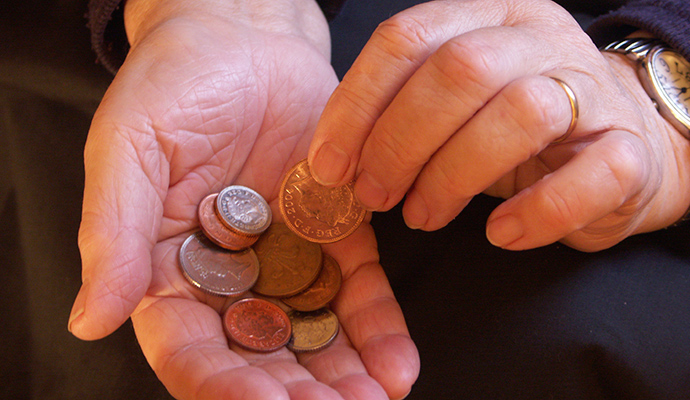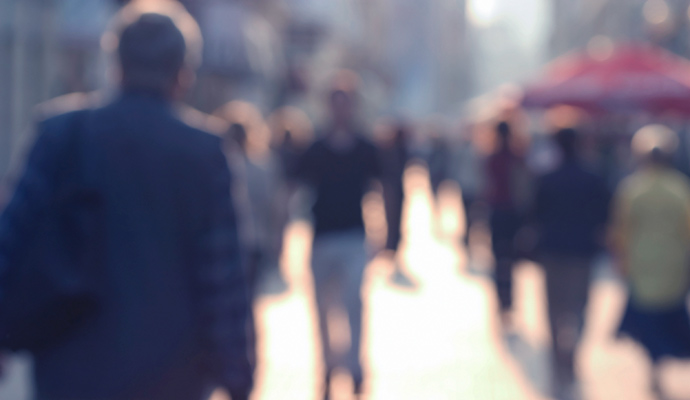How I lost all my money
I had a successful career and a good life. I never imagined that one day I'd be poor.

A free daily email with the biggest news stories of the day – and the best features from TheWeek.com
You are now subscribed
Your newsletter sign-up was successful
THE RICH ARE all alike, to revise Tolstoy's famous words, but the poor are poor in their own particular ways.
I have some personal experience here. Like a lot of other people, I started life comfortably middle class, maybe upper-middle class; now, like a lot of other people walking the streets of America today, I am poor. To put it directly, I have no money. Does this embarrass me? Of course it embarrasses me — and a lot of other things as well. It's humiliating to be poor, to be dependent on the kindness of family and friends and government subsidies. But it sure is an education.
If money defines class, the sociologists would say I was probably at the higher end of the lower classes. I'm not working class because I don't have what most people consider a job. I'm a writer, although I don't grind out the words the way I once did. Which is one reason I'm poor.
The Week
Escape your echo chamber. Get the facts behind the news, plus analysis from multiple perspectives.

Sign up for The Week's Free Newsletters
From our morning news briefing to a weekly Good News Newsletter, get the best of The Week delivered directly to your inbox.
From our morning news briefing to a weekly Good News Newsletter, get the best of The Week delivered directly to your inbox.
My income consists of a Social Security check and a miserable pension from The Washington Post, where I worked intermittently for a total of about 25 years, interrupted by a stint at a publishing house in New York City. I returned to the Post, won a Pulitzer Prize, continued working for another eight years, with a leave of absence now and then. As the last leave rolled on, the Post suggested I come back to work or, alternatively, the company would allow me to take an early retirement. I was 53 at the time. I chose retirement because I was under the illusion — perhaps "delusion" is the more accurate word — that I could make a living as a writer, and the Post offered to keep me on its medical insurance program, which at the time was very good and very cheap.
The pension would start 12 years later, when I was 65. What cost a dollar at the time I accepted the offer would cost $1.44 when the checks began. Today, what cost a dollar in 1986 costs $2.10. The cumulative rate of inflation is 109.7 percent. The pension remains the same. It is not adjusted for inflation. In the meantime, medical insurance costs have soared. Today, I pay more than twice as much for a month of medical insurance as I paid in 1987 for a year of better coverage. My pension is worth half what it was. And I'm one of the lucky ones.
I was never remotely rich by what counts for rich today. But I look through my checkbooks from 25 and 30 years ago and I think, Wow! What happened?

IT WAS A long, slowly accelerating slide, but the answer is simple. I was foolish, careless, and sometimes stupid. As my older brother, who to keep me off the streets invited me to live with him after his wife died, said, shaking his head in warning, "Don't spend your capital." His advice was right, but his timing was wrong. I'd already spent it.
A free daily email with the biggest news stories of the day – and the best features from TheWeek.com
I'd wanted to explore and write about Eastern Europe after the fall of the Berlin Wall, which I did for several years. It was truly a great adventure: It changed my life, and it was a lot more interesting than thinking about what it cost, which was a lot. There'd always been enough money. I assumed there always would be. (I think this is called denial.) So another dip into the well.
I bought shares in AOL before it really took off and in Apple when it was near its bottom. I figured Apple's real estate must be worth more than the value the market gave the company. I was right. Shares in both companies soared. If I'd shut up and stayed home…but I didn't. I turned my brokerage account into a margin account for someone else to handle, and I left the country again. A few more dips into the well, a few turns in the market, a few margin calls, and when I went back for another dip, the well was empty. The old proverb drifts back to me on a wisp of memory. A fool and his money are soon parted. My adventures were over.
The story is, of course, more complicated than that — whose story isn't? — but these are the essentials. It's unlikely, and it's not intended, to evoke sympathy. I'd acted like one of those people who win the lottery and squander it on houses, cars, family, and Caribbean cruises. But I hadn't won the lottery; I'd fallen under the spell of magical thinking. In my opinion, I didn't squander the money, either; I just spent it a little too enthusiastically. I don't regret it.
(This article originally appeared in The Week magazine. Try 4 risk-free issues, and stay up to date with the week's most important news and commentary.)
When my writing was bringing in a little money, I had a Keogh plan, and when I was at the Post, a 401(k) account. I'd made a little money in real estate and received a couple of modest but nice inheritances, which together, and with Social Security and the pension, would have given me enough income to live on, had I not felt I'd lost the ability to continue writing and had I forgone, or at least spent more modestly on, my work in Europe and related activities, avoided the margin account, and so on. The "so on," I should add, included a major heart attack that led to congestive heart failure, a condition that greatly reduced my physical resilience and taxed my already-limited income.
There are a lot of people like me, exiles from the middle class who suddenly find themselves on Grub Street. I am not trying to exaggerate my own particular plight. I've never had to apply for welfare or Medicaid or food stamps. I have asked the Department of Housing and Urban Development (HUD) to subsidize my rent and a Washington, D.C., office to subsidize my medical insurance payments. That involved a lot of paperwork but not a lot of lines, and I am very glad to live in subsidized housing with a number of people who really run the gamut. One of them is the great-grandson of Leo Tolstoy. Some were trained as lawyers, some have doctoral degrees, some were teachers. There are journalists and writers. What we have in common is we are all older, we are all poor, and each of us has, to a greater or lesser degree, the ailments that come with age. As everybody knows, if you don't have good insurance, medical bills can be catastrophic and have been for some of us here. But I think all of us would agree that living here beats living in a homeless shelter.
Compared with most poor people, I am fortunate. If you've got to be poor, finding yourself at the upper edge of poverty with a roof over your head and a wardrobe that doesn't look as if it came from the Salvation Army is as good as it gets. It also helps to be white.
An African-American trainer at a gym I used to go to before the well went dry had a lot of clients and must have made decent money, enough to support himself and his son, anyway. He was walking down Connecticut Avenue one day when he saw one of his female clients approaching.
"I don't have any," she exclaimed and turned abruptly away as he was opening his mouth to greet her. "I don't have any money!"
She didn't see my friend Jeff; she saw a black man in trainers about to ask her for a handout on one of the busier avenues in the city. Jeff doesn't look like a hustler. He doesn't look poor. I don't look poor, either, but I am white. So I never suffered that kind of demeaning slight.

BY FEDERAL GOVERNMENT standards, I'm not poor, but by any rational standard, I am. My income is above $11,670 annually, which, in 2014, puts me above the poverty line for a single person. My Social Security comes to more than that. The federal minimum wage in 2014 is $7.25 an hour, or $15,080 annually. When FICA taxes of 7.65 percent for Social Security and Medicare are deducted, that brings the income of a full-time minimum-wage worker to $13,949. For a family of three, the poverty line is $19,790. This is not a joke. It doesn't leave much extra for an ice cream cone.
I have a roof over my head, thanks to the aforementioned HUD subsidy, which required hours of paperwork, signed affidavits from doctors, many duplicate copies, and a lot of running around.
If you're poor, what might have been a minor annoyance or even a major inconvenience becomes something of a disaster. Your hard drive crashes? Who's going to pay for the recovery of its data, not to mention the new computer? I'm not playing solitaire on this machine; the hard drive holds my work, virtually my life. It is not a luxury for me but a necessity. I need dental work. Anybody got $10,000? Dentists are not a luxury. Dental disease can make you seriously ill. Lose your cellphone? What may be a luxury to some is a necessity to me. Without that telephone and that computer, my life as I have known it would cease to exist. Not long after, so would I. I am not eager for that to happen. Need to go to a funeral hundreds of miles away? Who pays for the plane ticket? In the case of the funeral, my nephew paid for the plane ticket. My daughter and son-in-law paid for the dental work. Sometimes, I find it deeply humiliating that I am dependent on such kindnesses when I would prefer that the kindnesses flow the other way. Most of the time, though, I am just extremely grateful for the help of family and friends. It's not so much humiliating as it is humbling, which is a good thing.
I am ashamed to have gotten myself into this situation. Unlike many who are born, live, and die in poverty, I got where I am today through my own efforts. I can't blame anyone else. Perhaps it should be humiliating to reveal myself like this to the eyes of any passing stranger or friend; more humiliating to friends, actually, some of whom knew me in another life. Most of my friends probably don't realize or would rather not realize just how parlous my situation is. Just as well. We'd both be embarrassed.
Although I am embarrassed by my condition and ashamed of myself for putting myself there, I feel grateful to have had some of these experiences and even more grateful to have survived them.
I am glad that none of my friends has ever found himself sitting on a bench in a park with a quarter in his pocket, as I once did, and nothing in the bank; in fact, no bank account. It's a very lonely feeling. It gives new meaning to the sense of loneliness and despair.
I wallowed in that slough for a bit. It was not, after all, a happy situation, and I am not a dim-witted optimist. But I had two choices: Die in the slough or move on. I thought of the last two lines of Milton's "Lycidas":
At last he rose, and twitch'd his mantle blue:
To-morrow to fresh woods, and pastures new.
So I got up, forever grateful to Mr. Barrows, my college English instructor, for teaching me to study "Lycidas" seriously and realize what a great poem it is and why that matters.
Excerpted from an article that appeared in the fall 2014 issue of The Hedgehog Review, published by the University of Virginia. Reprinted with permission.


